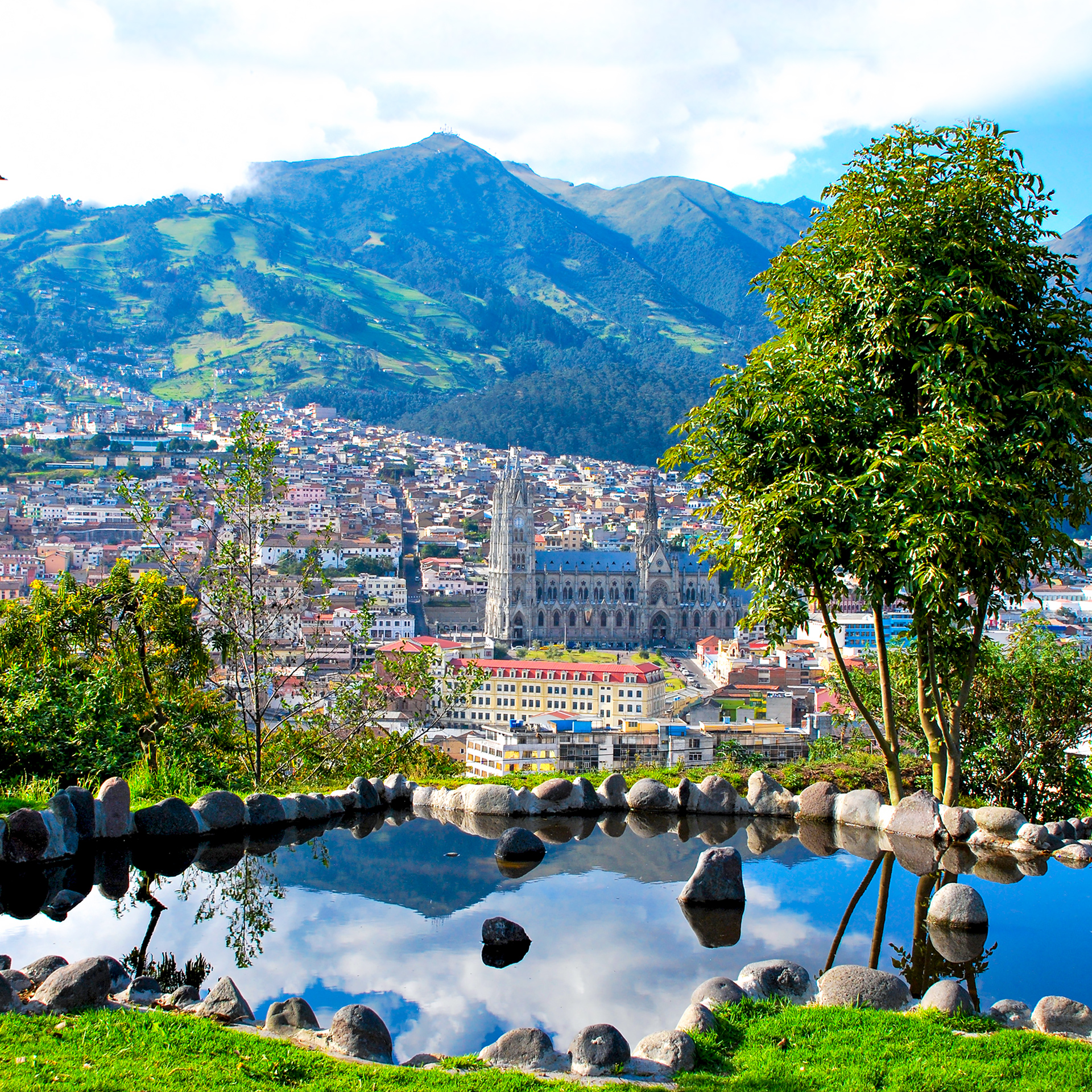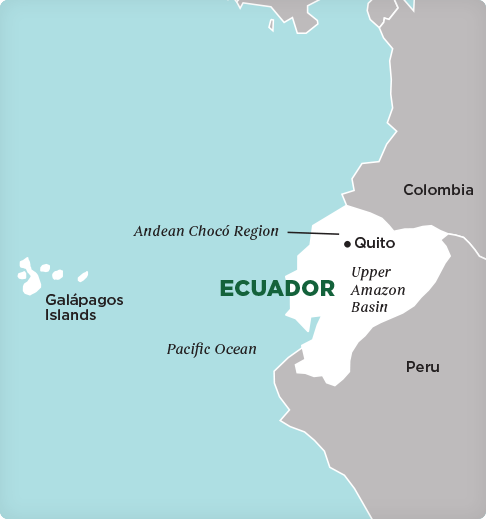Credits
16
Prerequisites
3 semesters Spanish
Language of Study
Spanish
Courses taught in
Spanish
Dates
Feb 3 – May 18
Program Countries
Ecuador
Program Base
Quito
Critical Global Issue of Study
Development & Inequality
Identity & Human Resilience

Study indigenous concepts of sustainability as it intersects with biological diversity, culture, and quality of life in Ecuador.
16
3 semesters Spanish
Spanish
Spanish
Feb 3 – May 18
Ecuador
Quito
Development & Inequality
Identity & Human Resilience
Living in Ecuador, you will experience a multilingual and multiethnic nation that is also one of the America’s most biologically diverse countries. Here, you’ll study development as well as alternatives grounded in indigenous worldviews that call for respect of natural resources. Two homestays will deepen your understanding of both urban and rural life and culture in Ecuador.
On excursions to the threatened Andean Chocó Biosphere Reserve and the Galápagos Islands you will observe the conflict between development and natural resource preservation. You will also visit the Upper Amazon, where you will experience direct exposure to political ecology and socio-linguistic issues regarding this highly diverse but threatened region.
You’ll explore how Spanish and indigenous languages are used to reinforce and reinvent power relationships as you consider how intercultural and inter-ethnic relations are shaped. You will learn basic Quichua and develop your Spanish language skills through classroom instruction, homestays, excursions, and cultural immersion.
Three recent semesters of college-level Spanish or equivalent and the ability to follow coursework in Spanish, as assessed by SIT.


You will visit the Galápagos Island to explore the impact of sustainability and tourism and the ways in which a place is constructed through dramatically varying discourses. During your excursion, you will visit civil society organizations, natural history sites, and learn about conservation initiatives led by the Charles Darwin Research Station, National Park headquarters, and civil society organizations.
During this four-day excursion, you will experience direct exposure to political ecology and sociolinguistic issues regarding this highly diverse but threatened region. Kichwa (Quichua) cosmology and mythology, language revitalization initiatives, inter-ethnic relations, resource management, and political mobilization are examined in the vicinity of the Napo and the Pastaza Rivers.
During your excursion to the Andean Chocó Biosphere Reserve you will witness the conflicts and links between development and natural resource preservation in one of the most biologically diverse, but threatened, ecosystems in the world. Examine how Ecuador is addressing one of its most challenging and controversial issues: how to develop while preserving the natural resources upon which its development has so often depended.
Please note that SIT will make every effort to maintain its programs as described. To respond to emergent situations, however, SIT may have to change or cancel programs.
Upon successful completion of the program, students will be able to:
The following syllabi are representative of this program. Because courses develop and change over time to take advantage of dynamic learning opportunities, actual course content will vary from term to term.
The syllabi can be useful for students, faculty, and study abroad offices in assessing credit transfer. Read more about credit transfer.
Languages in Contact: Spanish, Quichua, and Other Languages in Ecuador – syllabus
(LACB3000 / 3 credits)
In this seminar, students combine theory and practice to study Ecuador’s languages in three different manners. First, from a cultural standpoint, students learn about the encounter between Spanish and Ecuador’s indigenous languages and how language and power have interacted and contributed to tensions between domination and resistance. They look closely at Ecuadorian Spanish to ask what makes Ecuador’s Spanish Ecuadorian, examining the influence of different populations, time periods, and events on the evolution of the language, considering regional differences as well. Finally, they study Quichua, Ecuador’s main indigenous language, examining the politics of bilingual education, questions surrounding intellectual production and translation, and the use of Quichua in different settings. Students also examine the growing concern for other indigenous languages, particularly those in danger of extinction. Finally, all students participate in a workshop of introductory lessons in Quichua to finish out this experience. This course is conducted in Spanish, although it may occasionally include a few readings in English and in Quichua.
Paradigms of Development and Political Discourse in Ecuador – syllabus
(LACB3005 / 3 credits)
Discourse and power are related in all nations, but Ecuador has a particularly sophisticated discursive system in place. At the same time, counter-hegemonic discourses are also prevalent. In this broadly defined interdisciplinary seminar, students examine the core political and development themes of the program and inquire specifically into the complex relationships between development, power, and politics in Ecuador. After a review of Ecuadorian history, socio-political movements and development paradigms, students consider the concept of political discourse as an object of study. Through lectures, course readings, site visits, and excursions, students examine several dominant discourses related to development, politics, sustainability, interethnic relations, and other issues in Ecuador. They study resistant discourses to ask how people are voicing alternative ways of knowing and developing. While learning about politics and development in Ecuador, students construct a nuanced understanding of how discourse has been used to instill, reinforce, subvert, and reinvent power relationships over time in this nation. This course is conducted in Spanish, although it may occasionally include a few readings in English.
Spanish for the Social Sciences I – syllabus
(SPAN2003 / 3 credits)
Spanish for the Social Sciences II – syllabus
(SPAN2503 / 3 credits)
Spanish for the Social Sciences III – syllabus
(SPAN3003 / 3 credits)
Spanish for the Social Sciences IV – syllabus
(SPAN3503 / 3 credits)
In this course, students refine their Spanish language skills with a focus on enhancing oral proficiency. The course deepens students’ contact with public, private, and community media in Ecuador and includes visits to several relevant sites in Quito. Students take an ungraded placement exam to determine the appropriate class placement. The outgoing exam includes both a written and an oral component.
Research Methods and Ethics syllabus
(ANTH3500 / 3 credits)
In this research methods course designed to prepare students for the Independent Study Project (ISP), students examine the ethical challenges of field research and learn how to prepare a research proposal and how to employ basic ethnographic methods appropriate to a range of themes as well as more specific methods appropriate to the study of politics, language, and discourse. By the end of the course students will have chosen an ISP topic, selected appropriate methods, and written a solid proposal for an ISP related to the program themes. The course is conducted in Spanish with occasional sessions in English.
Independent Study Project syllabus
(ISPR3000 / 4 credits)
Conducted in Quito or in another approved location in Ecuador appropriate to the project, the Independent Study Project offers students the opportunity to conduct field research on a topic of their choice within the program’s broad concerns with power, politics, language, and development. The project integrates learning from the various components of the program and culminates in a final presentation and formal research paper.
Sample ISP topics:
Browse this program’s independent study projects / undergraduate research.


Positions held by recent alumni of this program include:
Environmental and Human Rights Campaigner at Amazon Watch, Oakland, CA
Policy Associate at OneAmerica, Seattle, WA
Fulbright Scholar at Universidad Autónoma de México, Mexico City, Mexico
Foreign Affairs Officer at the U.S. Department of State, Washington, DC
Program Associate for Latin America and the Caribbean at the Center for Reproductive Rights, New York, NY
Fulbright Fellow researching AfroEcuadorian collective rights, Ecuador


SIT Study Abroad is committed to ensuring that international education is within reach for all students. We believe in the transformative power of immersive, intercultural experiences and are dedicated to supporting students in their educational journey.
See Full Breakdown
A critical step in preparing for your study abroad program is planning how you will maintain your health and wellbeing. Please review the following information carefully and contact [email protected] with any questions or concerns.
View Information
For her ISP, alumna Elizabeth Hasier produced a video on the environmental and social impacts of the shrimp industry in southwestern Ecuador.
Hear a discussion on climate change in Ecuador with Academic Director Fabian Espinosa.